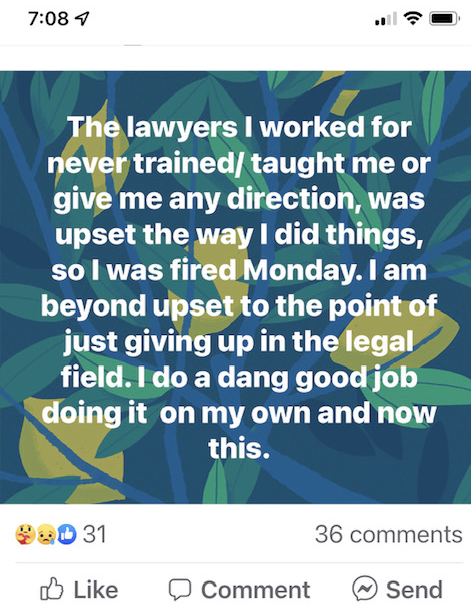It happens to so many. You start a new paralegal position, and then you wonder for months when you’ll get that on-the-job training that will show you exactly what you should be doing every day. But it never comes. You’re stuck playing the guessing game and scrambling to figure things out on your own, hoping you don’t make a mistake along the way.
Should you keep struggling daily to understand how to do your job well? No! We’ll show you what you can do in lieu of that on-the-job training to get ahead and fast-track your success.
You’ve probably seen the quotes before from the US Bureau of Labor Statistics when they talk about the growth of the profession.
If you search US BLS paralegal job and look at the table at the top labeled Summary. It has the median pay, the education level, etc. It also has a section for “on-the-job training,” and it says none.
If you click the question mark to expand it, it says: Additional training needed (post-employment) to attain competency in the skills needed in this occupation. There is no on-the-job training.
That’s what every paralegal should know going in.
That would have been good to know before you invested $5,000 into that paralegal certificate after already completing your college degree, right?
It is what it is. So what can you do now?
Your Options for Gaining On-the-Job Training
If you’re not getting the on-the-job training that you thought you would (or you’re not getting any), you have to go out and get it.
You only have two options:
-
- Go and get the training you need
- Keep struggling and wait for someone to find the time to provide you with the training.
That’s the cold, hard truth. Well, there is a third option. That is to keep doing what you’re doing, try not to make too many mistakes, ask as many questions as possible without being overbearing, and hope that the attorney is patient and understanding regarding your lack of experience. But I’ve seen that the third option does not go so well. You probably have too. If you haven’t seen it firsthand in your office, you’ve probably read some of the posts on social media.
Let me share a couple of them for those who are not active in some of these Facebook groups.


There are dozens more of these that I could find. It’s sad. But I have to get back to the cold, hard truth because I’m not here to placate people.
Remember, we’re here to give you actionable strategies to fast-track your paralegal career.
Assuming you don’t want to choose option two (or worse yet, just throw up your hands and leave the paralegal profession), then your actionable strategy is to GO AND GET THE TRAINING that you need. This is your responsibility. This is your career.
Learn Why Fake It Till You Make It Is A Bad Idea
I’ve also had plenty of discussions like these with other legal professionals advocating for law firms to prioritize their paralegal training: Listen to the Paralegal Boot Camp interview here.
Stop the Blame Game
I’d love to blame the attorneys who don’t take the time to train you, even though they knew when they hired you that you had no experience.
And I’d love to blame the senior paralegal down the hall who’s stingy with her knowledge because she has a scarcity mindset and doesn’t want you to succeed.
But I can’t blame them. Because for every one of them, there is a paralegal down the hall who WANTS you to succeed, but they have their own job to do. They have deadlines, they are not going to risk missing just because the two of you set a time to meet so she could show you how to put together a deposition summary – and now she doesn’t have the time. Remember that your attorney, those fellow paralegals – they are not a paralegal training company. They have a whole set of job responsibilities that usually don’t include training other paralegals.
And I’d love to blame the schools for not having a more comprehensive training program, but I can’t do that either because none of them can show you what it looks like to work in a particular practice area, in a particular firm, for a particular lawyer – because every one of them is going to be different.
Here are 5 Things Paralegal Schools Forget to Mention.
So, who do we get to blame? No one. We take the responsibility for it ourselves and decide if we will be cut out to be a paralegal. Part of that means being resourceful enough to figure it out and find the training that you need to do a good job.

Take Responsibility for Your Career
If you haven’t already, read the blog I did last week on the 3 Traits of a Rockstar Paralegal, as soon as you finish this blog, because in it, I discussed accountability.
Let’s apply that here. Are you taking accountability for the success of your career?
You got your paralegal certificate. Congratulations! That’s no small feat. But that is only the beginning.
If you do nothing but that and then get a job at a law firm and you receive no on-the-job training, you are significantly decreasing your odds of success.
Now you can go on social media and complain that no one is willing to train you. Or you can do something about it. Go and get the training!
Look, I know this is a little bit of tough love, but I feel like it’s necessary so that you don’t just give up. So that you don’t just throw your hands up and say, “I guess I’ll go do something else with my career.”
Instead, you do some research and find a course that’s going to teach you a skill you know you need. Let’s say you’ve found an online course specific to your practice area, but the firm won’t pay for it, and you don’t have the $800 to pay for it yourself or the room on your credit card to charge it.
Well, first, before I go there, let me address the part that your firm won’t pay for.
Is it that you THINK they won’t pay for it, but you’ve never asked? Or are you afraid to ask because then you’re admitting to them that you don’t know what you’re doing?
Let’s talk about the first one: you THINK they won’t pay for it. You know the saying from last year, after that interview I had with Kim Barrett – she said it first – but I repeated it several times last year: If you don’t ask, the answer is always no.
Don’t assume they won’t pay for it if you’ve never even asked.
Now let’s talk about the second one – are you afraid to ask because then you’ll be admitting that you don’t know what you’re doing? Guess what? They already know that. It’s time to set your ego aside for the sake of your paralegal career. You don’t have to start the conversation with, “I don’t know what I’m doing here.” Use the approach I discussed in the blog How to Get Your Attorney to Invest in Your Career Development.
What if you don’t have the time to take a course?
That’s what I hear often: I’m already so busy with work and life, I just don’t have the time to take a course.
I get it. We’re all busy. But when you’re early in your paralegal career, you can’t afford NOT to make the time to learn the critical skills needed to be successful.
👉 Here is a quick (and free) Paralegal Boot Camp training on time management to help you.

Finding the On-the-Job Training You Need
Let’s assume that you’re a new litigation paralegal and you found a training program like the Litigation Paralegal Boot Camp. You asked, and the firm said no. Then look at what’s inside the course and turn it into a checklist of what you want to learn this year, and figure out a way to get that information from other sources.
Wait…did she just say not to purchase her course and find the training elsewhere? No. What I’m saying is if there is no possible way for you to enroll because of financial reasons, that shouldn’t stop you from getting the skills you need.
Is it going to take longer? Yes. A lot longer. You know the saying, “you get what you pay for.” That applies to going out and trying to find little nuggets of free information instead of paying for training. But that shouldn’t stop you if you care about your career.
Looking at the Litigation Boot Camp as an example, let’s pick Module 4 on the sales page. We see that it’s all about the discovery phase of a litigation case.
You see it’s going to train you on the following:
-
- How to draft discovery requests
- How to draft discovery responses and objections
- How to prepare for depositions
Now, it’s got much more than that in Module 4, but I just want to list these 3 for this example, or we’ll be here all day.
And again, this could be any course. If you’re a new real estate paralegal who found a course on big commercial real estate closings, you can do the same thing. Make a list of what they’ll be teaching you inside that course that you can’t afford. Start a checklist, or put it inside a career development plan.
Take the list, and then do a Google search or a YouTube search for the words “how to draft discovery requests,” and maybe even add the word paralegal. It’s up to you.
What are the results? Too many. And many of them are irrelevant. However, some of them may contain a few nuggets of valuable information that you can piece together. Remember, we’re being resourceful here.
One tip is to set a timer on your phone for 30 minutes. Stop at that 30-minute timer. Otherwise, you’ll be running down that Google rabbit hole for hours.
Then repeat the process with the others on the list. Limit it to 30 minutes per day.
Now, you might be out there saying – that it’s going to take SO MUCH MORE TIME than it would to just sign up for your course. Yes, and that’s what I mean by you get what you pay for.
That strategy is what I’ll call the emergency SOS strategy when you have absolutely no other options for getting on-the-job training.
It’s also assuming that you have exhausted all other options, including asking the attorney to show you how to do it, asking the other paralegals how to do it, and looking at forms and templates inside your firm’s document management system. You’ve tried all of that and you’re at the end of your rope.
Find out what you learn in school vs on the job.
Your Actionable Strategies for Getting On-the-Job Training
Let me break down all that I said into steps that you can take to get the paralegal training you need, in the order that uses your time most efficiently.
-
- Ask your firm to pay for the outside training.
- If that’s a no, then pay for it yourself.
- If that’s not feasible at this time, then ask the course provider if they offer a payment plan option. Our more expensive courses offer one. For example, the Litigation Paralegal Boot Camp is $697 (yes, that’s not cheap, but that’s because it’s 16 hours and teaches you LITERALLY EVERYTHING you need to be a successful litigation paralegal). We also offer a monthly payment plan. Most people can swing that. Even if there’s no payment plan option on the website, it doesn’t hurt to reach out through their contact us page and ask if they offer a payment plan. Again, if you don’t ask, the answer is always no.
- If you can’t swing it with a payment plan, then ask the attorney to train you.
- Ask a paralegal colleague to train you.
- Find the free training, piece it together, and train yourself. Be resourceful. Be accountable to yourself and your career.
And I’ll be here to support you by continuing to put out content on our blog, our podcast, and our courses that provide training for paralegals who want to excel in litigation, personal injury, eDiscovery, and more.
Are you starting a new paralegal career in litigation?
Join Ann Pearson in the next group inside the Litigation Paralegal Boot Camp. It will be the best investment you’ll ever make in your career!
Here’s what other paralegals are saying about the Litigation Paralegal Boot Camp:
Very useful for someone who had to always figure out everything on their own
I found this course very useful because I learned a lot of new information about trial preparation. I was one of those paralegals who had never had to assist the attorney with trial prep because most of our cases were settled. Now, as the courts are reopening, I am excited to be better prepared when I do need to assist the attorney. All of the templates are great as well!
By Natalia Arana
It was very detailed and informative. Details are important because they paint pictures in my head that assist in visualizing the outcome of specific methods. The details also indicate the why’s; the hows; and the what, which give a deeper insight into why particular aspects of the litigation cycle are important. I am enjoying the thoroughness and detailed manner in which Ann Pearson is presenting the various steps of the litigation cycle, as opposed to just presenting cut-and-dry material and facts; Paralegal school was not as detailed.
By Anita Pickett
This course is one of the most practical and valuable courses available to further your paralegal education. It is full of information and resources.
By Misty Sheffield
👉 Get the FREE Paralegal Boot Camp 3-Step Method to Better Case Management.
Meet the Author

Ann Pearson is the Founder of the Paralegal Boot Camp, and host of the Paralegals on Fire! Podcast Show, and passionate about promoting the paralegal profession.
Ann spent 20 years working as a paralegal manager and a litigation paralegal before opening the Paralegal Boot Camp in 2010.
Ann’s training programs focus on adding immediate value to a paralegal’s career and bridging the gap between what a paralegal learns in school and what they actually do on the job.
Visit the About Us Page to learn more about why Ann started the Paralegal Boot Camp.
Follow Paralegal Boot Camp on Instagram.

























